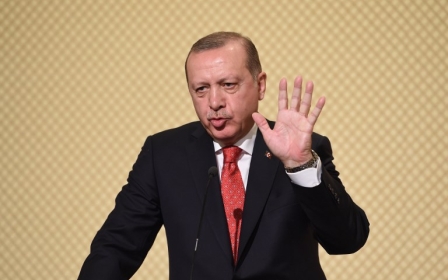Fighting in northwestern Syria kills 66, says monitor

Clashes between rebel fighters and government forces backed by Russian warplanes killed 66 people on the edge of Syria's northwestern Idlib province, a monitor said on Friday.
Over 24 hours of fighting in an area straddling Idlib and Hama provinces, at least 19 civilians, including seven children, were killed by air strikes, the Britain-based Syrian Observatory for Human Rights said.
Observatory head Rami Abdel Rahman said 27 soldiers and members of allied paramilitary units were killed in the fighting as well as 20 anti-government combatants from Islamist rebel groups.
The fresh violence in the area appeared to signal the initial phase of a major government operation against Idlib, the only province in the country that has completely escaped government control.
An AFP correspondent near the fighting said aerial activity was intense and the entire area had been rocked by frequent air strikes.
Rebel leaders issued warnings through loudspeakers informing remaining civilians in the area that Friday prayers were cancelled and that all residents should stay at home.
Hundreds of civilians fled the scattering of villages in the area, creating queues of cars and pick-up trucks heading towards the city of Idlib loaded with bags and furniture.
"The air strikes haven't been that intense in months in this area," said Abdel Rahman, adding that the immediate goal of the latest regime push was to retake control of the southeast of the province.
The Islamic State group, which proclaimed a caliphate over swathes of Syria and Iraq in 2014, has now lost almost all the land it once controlled.
But other factions opposed to the regime of President Bashar al-Assad still control pockets scattered across Syria, the largest one being Idlib province, which borders Turkey.
Another is Eastern Ghouta, a small enclave east of the capital Damascus, which is controlled mostly by rebels from the Jaish al-Islam group and where around 400,000 residents still live.
Medical evacuation
The humanitarian situation there has deteriorated sharply in recent months and on Friday aid workers completed a series of medical evacuations of the most critical cases.
The last 13 in a group of 29 priority patients were evacuated overnight Thursday to Friday, a health official in Eastern Ghouta said.
They were deemed among the most pressing cases on a list of around 500 people the United Nations said last month could die without urgent treatment outside the enclave, which has been besieged for four years.
A crowd of residents gathered at night around the ambulances to see their relatives and neighbours one last time.
Red Crescent nurses attended to Marwa, a 26-year-old woman suffering from meningitis, who was being stretchered onboard and given respiratory assistance.
Among the patients who made it out were Fahed al-Kurdi, a 30-year-old man with cancer, and Zuheir Ghazzawi, a 10-year-old boy who also has cancer and had a leg amputated.
According to the Observatory, the patients were evacuated as part of a deal that saw the rebels who control Eastern Ghouta release hostages and prisoners.
There were also 29 of them, including workers who were detained earlier this year and pro-government fighters captured by rebels in the area, in some cases years ago.
The deal raised concern that sick civilians were being used as bargaining chips.
"If they exchange sick children for detainees that means children become bargaining chips in some tug of war," Jan Egeland, head of the Norwegian Refugee Council and currently a UN special envoy for humanitarian access in Syria, told the BBC.
Stay informed with MEE's newsletters
Sign up to get the latest alerts, insights and analysis, starting with Turkey Unpacked
Middle East Eye delivers independent and unrivalled coverage and analysis of the Middle East, North Africa and beyond. To learn more about republishing this content and the associated fees, please fill out this form. More about MEE can be found here.




